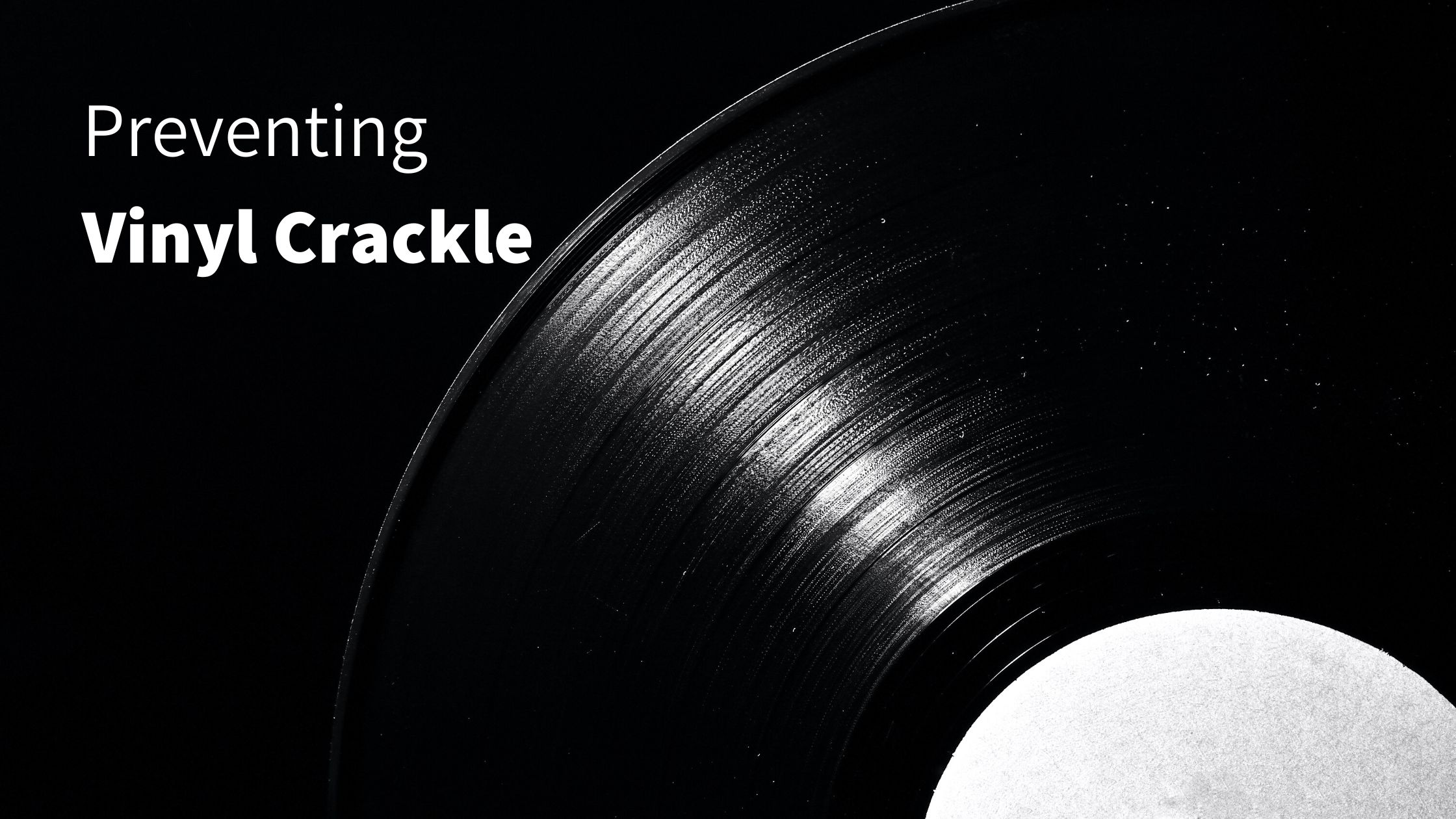There’s a big difference between the authentic and nostalgic analog sound that vinyl records provide and the persistent crackles that affect the quality of your listening experience. For new enthusiasts, this could be hard to discern.
If you’re hearing a persistent vinyl crackle or even a pop, it could be due to dust, debris, or even surface damage. This article will dive into the cause of vinyl crackles and what you can do to stop it.
Key takeaways
- The main causes of vinyl crackles include static build-up, damage to the grooves of the record, dirt, and debris collecting on the surface, and pressing flaws.
- record, dirt and debris collecting on the surface, and pressing flaws.
You can reduce vinyl crackle by using an anti-static brush before playing, keeping your records clean, and using anti-static storage solutions. - To prevent vinyl crackling, store and handle records with care.
What causes vinyl crackles and how does it happen?
A faint vinyl crackle is normal with most vinyl records, but if it’s excessive, it can detract from your listening experience. If it’s far too prominent, it can distract from the music that’s being played, and several factors could be causing this vinyl noise to occur.
The main culprits include:
- Static build-up
- Damage to the grooves of the record
- Dirt and debris collecting on the surface
- Pressing flaws
You may not be able to immediately determine the exact cause of the vinyl crackles you’re hearing, but you should be able to figure it out through a process of elimination. These aren’t the only cause of vinyl noise, but they’re definitely the most common contributors.
What exactly is that vinyl crackle sound?
You hear crackling noises on vinyl due to obstruction on the surface of the record. As the turntable’s stylus passes by these obstructions, it causes a vinyl crackle sound to occur. Once again, a mild amount of vinyl noise is pretty standard with most vinyl records, but it can be over the top to where it’s affecting the sound quality of the output.
Another way to tell that something might be wrong is if you hear a certain vinyl crackle or pop at the same spot during each rotation of the record. That tells you that there’s some kind of obstruction sticking out from the surface that may not be a part of the normal vinyl noise records are known for.
The main causes of vinyl noise
If the noise is bothering you, it’s time to look into exactly what may be causing it. Some causes are much more common than others, so it’s a good idea to with the obvious offenders first.
Dust and debris
A dirty record will undoubtedly generate noticeable vinyl noise. Thankfully this is usually an easy fix, but if you haven’t cleaned your records for a long period of time, debris could be firmly embedded into their grooves.
Nevertheless, having a microfiber cloth on hand can help you avoid this issue. Dust and other microscopic particles in the grooves will quickly affect the stylus’ ability to track properly. Not only will you hear an increase in vinyl noise, but there will also be a drop in the overall sound quality.
A microfiber cloth is definitely helpful, but it’s also essential to keep it clean so you don’t accidentally reapply dust particles when wiping down your records. You can also use a cleaning solution with the cloth for even better results, and it’s important that you wipe your records in a circular motion to go along with the grooves.
No matter how you approach it, vinyl records are bound to collect debris any time you take them out of their sleeve, so cleaning them should be a consistent effort.
Static build-up
Vinyl records are known to build up static to a degree, and this is usually caused by a number of factors. From the packaging to the production process and the type of mats you use, any added electrons to a vinyl record can cause an increase in vinyl noise. If it’s bad enough, it can have a negative effect on the sound quality as well.
Static build-up can also attract dust, which is another reason why keeping your records clean is so important.
There are a few go-to solutions for minimizing static on vinyl records, one of the most popular being the use of a carbon fiber brush. You can also look into purchasing an anti-static gun which is a very practical option for removing static. It’s also important to consider the type of mat you’re using, as standard felt mats are notorious for generating static energy.
Record damage
You’re bound to encounter some damage on your records over time, and if you’re shopping for vintage records, a little damage is almost guaranteed. This is a trickier aspect of vinyl noise, as damage to the grooves of a record doesn’t generally have a quick fix. You could consider taking it to a repair shop, but this could be costly.
Malformations in the grooves, minor scratches, and any physical defect can add to the vinyl noise you hear during playback. Considering most people won’t look into repairing a record, you want to ensure that you take proper care of your collection to avoid this. As long as you keep them inside their protective covering, don’t stack them, and keep them away from extreme temperatures, you can minimize the chance of damaging them.
Pressing flaws
Unfortunately, there’s always the possibility that a vinyl record wasn’t pressed correctly during production. A small amount of vinyl noise is definitely normal, but if you’re noticing a substantial amount of vinyl crackle in the audio quality, this could be a potential cause. You’re likely to come to this conclusion after you’ve gone through the process of elimination with the other causes in this article.
Noticing these flaws isn’t something most average listeners will pick up on. Pressing flaws could include a worn stamper or even contaminants blended in with the PVC, which is the base ingredient of what goes into creating a vinyl record. There isn’t much you can do about this particular issue, as the excess vinyl crackle is coming from how the vinyl was made.
How to reduce and prevent vinyl crackle
Regardless of what’s causing the excessive vinyl noise, there are numerous solutions available to help mitigate this issue. Some are more effective than others, but you won’t always have to deal with surface noise affecting the sound quality of your vinyl records.
Use an anti-static brush before playing
To handle static build-up, you may not need to go as far as using an anti-static gun, but having a reliable static brush on hand never hurts. Lightly using your brush in a circular motion on the surface of a record will help with the quality of your listening experience. Do this before placing a record on the turntable, and it’ll help with some of the excessive vinyl noise.
Keep your record collection clean
Keeping your records free of dust and debris is one of the best things you can do to mitigate too much crackle. Always have a microfiber cloth and cleaning solution on hand, and the stylus will be able to track each groove with the utmost precision and detail. Most of the debris that’s affecting the sound is compressed in the grooves, so you always want to wipe along the grooves in a circular formation.
Consider anti-static storage solutions
Another way to tackle static build-up is by using anti-static inner sleeves. It’s an effective method that doesn’t require too much manual effort and can significantly affect the amount of vinyl crackle you hear during playback.
Store and handle records with care
Lastly, do everything you can to avoid any kind of damage to your vinyl records. This includes how you store, handle, and clean them on a regular basis. Vinyl records are rather sensitive and fragile, and it doesn’t take much to scratch the surface or damage the grooves.
Conclusion
Everyone enjoys a small amount of crackle with their vinyl records, but if it ever becomes excessive, it’ll have an adverse effect on the listening experience. With the proper amount of care, you can avoid these issues and ensure your favorite record stays in the best shape possible.
If too much vinyl noise is something you’re struggling with, you can use the information in this article to mitigate it to the best of your abilities.

Lead Editor / Owner
After beginning his career in the video and audio recording industry, Andrew started HiFi Hippo to share his knowledge and passion for vinyl and vintage audio with other readers.
